News
Taylor Swift saga: Tug of war over tour sparks Thailand rift (video)

The enthralling world of pop music collided with geopolitical tensions when news broke of a clandestine deal allegedly orchestrated by Singapore to monopolize Taylor Swift’s Southeast Asian tour. This intricate web of politics, economics, and celebrity intrigue captivated nations across the region, sparking a contentious debate over the ethics of exclusivity in the entertainment industry.
The Setting: Swift’s Tour and Southeast Asia’s Reaction
As Taylor Swift graced the stages of Singapore with her Eras Tour, whispers of a covert agreement emerged, leaving neighboring countries—particularly Thailand and the Philippines—stunned and disgruntled. The decision to confine Swift’s performances solely to Singapore raised eyebrows and ignited a fervent discussion on fairness, economic implications, and diplomatic relations.
Reports circulated detailing Singapore’s purported negotiation with Swift, offering exorbitant sums—up to US$3 million per show—to secure exclusive rights to the Eras Tour. This move, deemed by many as shrewd and strategic, aimed to position Singapore as the ultimate destination for Swift’s legion of fans, known affectionately as Swifties.
Thailand’s Response: Diplomatic Discontent

Thai Prime Minister Srettha Thavisin, speaking at the iBusiness Forum 2024 in Bangkok, publicly criticized Singapore’s maneuver, questioning the rationale behind Swift’s omission of Thailand as a tour destination. He lamented the missed opportunity for economic stimulation and cultural exchange, suggesting that hosting Swift’s concerts in Thailand could have been mutually beneficial.
Filipino politician Joey Salceda voiced concerns over the perceived economic ramifications of Singapore’s exclusive deal with Swift. He urged the Department of Foreign Affairs to protest against the decision, viewing it as a betrayal by a supposed ally. The Philippines, like Thailand, felt sidelined and overlooked in the grand scheme of Swift’s tour.
Singapore’s Defense: Economic Benefits and Strategic Partnerships
While Singapore remained tight-lipped about the specifics of the alleged exclusivity clause, the tourism board and culture ministry emphasized the significant economic advantages brought by Swift’s concerts. They touted the collaboration with concert promoter AEG Presents as a testament to Singapore’s prowess in attracting global talent and fostering cultural vibrancy.
Swift’s sold-out series of six concerts in Singapore promised a windfall for the local economy, with over 300,000 tickets snatched up by eager fans. The influx of visitors and spending opportunities underscored the immense allure of hosting international megastars like Swift. Despite the scorching tropical heat, fans queued overnight, eager for a glimpse of their idol.
Behind the Scenes: Swift’s Personal Connection to Singapore
Amidst the spectacle of her concerts, Swift shared a touching anecdote with her audience, revealing her mother’s ties to Singapore. Recounting childhood memories and familial connections, Swift’s sentiments added a poignant layer to the narrative, highlighting the personal significance of the tour stop.
As Swift enchanted audiences with her performances, anticipation mounted for her upcoming album, The Tortured Poets Department. Fans eagerly awaited the release of this highly anticipated record, buoyed by the promise of new music and the emotional resonance of Swift’s storytelling.
In conclusion, the Taylor Swift controversy underscored the intersection of music, diplomacy, and economic interests in the modern era. The tug of war over Swift’s tour served as a microcosm of larger geopolitical dynamics, highlighting the complexities of international relations in an increasingly interconnected world. As the saga unfolded, it prompted reflection on the power of celebrity influence, the value of cultural exchange, and the enduring allure of music as a unifying force.
News
Pickup truck crash in Lampang kills one amid heavy rain
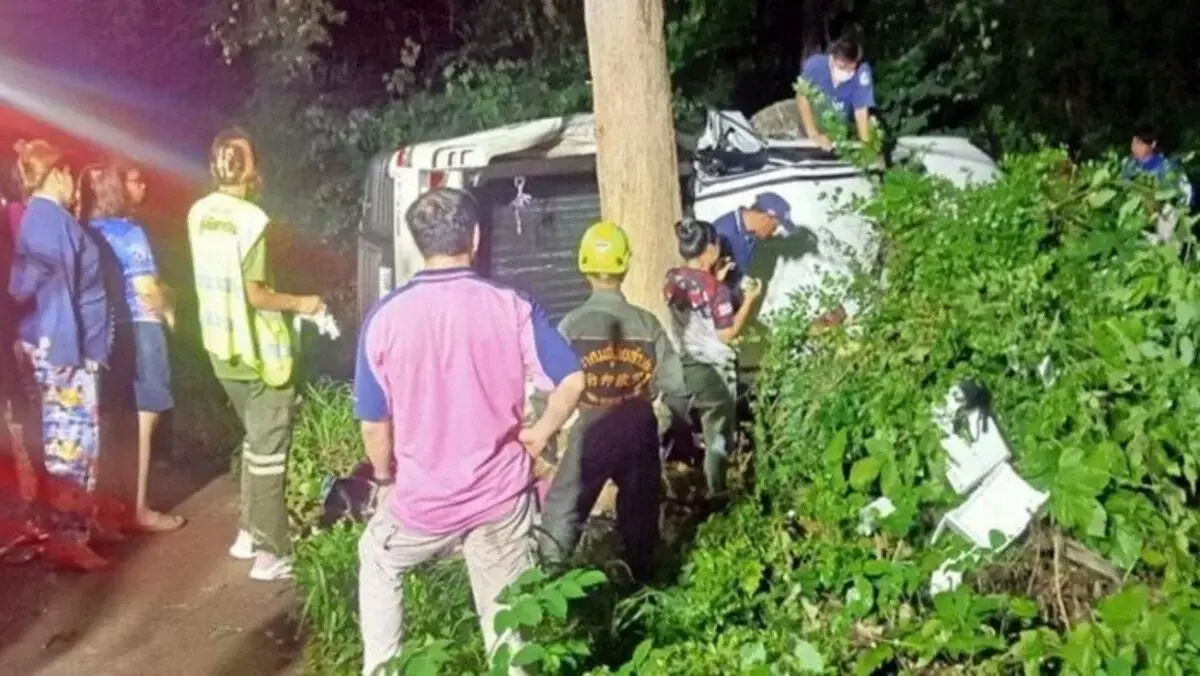
Due to heavy rain, a pickup truck returning from Chiang Mai skidded off the road and crashed into a tree in Thoen, Lampang.
Despite the efforts of rescue teams, a 50-year-old woman tragically lost her life.
The accident was reported to Thoen Police Station in Lampang at 6:50 PM yesterday, July 30.
The incident occurred on Phahonyothin Road, between kilometer markers 632 and 633, near the Mae Thot intersection in Thoen district.
Rescue units from Mae Thot, Lampang, Thoen, and Ombun Thoen were promptly dispatched to the scene.
Related News: Police arrest violent
Upon arrival, responders discovered a white, four-door Mazda pickup truck with a Surin registration overturned and severely damaged from colliding with a large roadside tree. Inside the vehicle, four injured individuals were trapped.
Rescue teams quickly extracted three injured and provided initial medical assistance before transferring them to a hospital.
However, a 50-year-old woman from the Na Pang subdistrict, Phu Phiang district, Nan province, who was seated in the back, sustained critical injuries and succumbed to them before she could be freed from the wreckage.
Initial investigations revealed that the group had traveled from Chiang Mai to Nakhon Pathom.
The accident occurred on a curved section of the road, worsened by wet and slippery conditions from the rain.
The vehicle lost control and crashed violently into the tree.
After extracting and treating the injured, the deceased’s body was transported to the hospital for further examination.
Police have launched a formal investigation into the accident. They are gathering evidence and statements from the injured to understand the exact circumstances leading to the crash.
The results of the investigation will guide necessary legal proceedings, reported KhaoSod.
Authorities advised.
“We urge all drivers to exercise extreme caution, especially in bad weather and on curved roads.”
News
Police arrest violent debt collector after tip-off in Bangkok

Police apprehended a member of a violent debt collection gang linked to the assault of a 73-year-old woman following a tip-off. He was caught while attempting to flee from a motel on the outskirts of Bangkok.
High-ranking police officials, including Thiti Sangsawang, Noppasin Poolsawat, and Thiradech Thamsuthee, along with a team of investigators, successfully arrested Kritchit, also known as 33-year-old Chit Thasala, from Nakhon Si Thammarat Province today, July 30.
He is one of the three members of the gang responsible for violent debt collection activities, including physical assault, intimidation, kicking doors, cutting off electricity, and locking debtors inside their homes.
The Min Buri Criminal Court issued an arrest warrant for Kritchit on July 23 for operating an unauthorized personal loan business, charging excessive interest, and threatening debt collection practices.
Related News: Thai vendor denies
He was apprehended at a hotel in the Saphan Sung district as he tried to escape in his car. During interrogation, Kritchit denied all charges, stating he had only completed Grade 9 and initially worked as a fruit farmer in Phuket’s Thalang District. In 2022, he sold his orchard land and used the proceeds to start a money-lending business.
He collaborated with two other suspects, Ta and Khet, who are still at large, to lend money in the Min Buri, Ram Inthra, Rom Klao, and On Nut areas.
They charged an interest rate of 20% daily, with borrowers typically taking out 5,000 to 6,000 baht loans. Kritchit claimed that Ta and Khet were responsible for using violence against the debtors on the day of the incident.
“I only worked with Ta and Khet to lend money. They were the ones who used violence.”
However, police remain skeptical of his testimony. Investigations revealed that Kritchit is romantically involved with the younger sister of Kenwit, another gang member who was previously arrested for assaulting the older woman.
Kenwit’s gang had attacked the 73-year-old in the Chokchai area. After receiving a tip-off, Kritchit fled to the hotel, where he was captured.
Police have transferred Kritchit to the Min Buri Police Station for further legal proceedings. His capture is a significant breakthrough in the ongoing crackdown against violent debt collection gangs operating in Bangkok and nearby areas.
As one of the lead investigators remarked, we are committed to cracking down on these illegal activities and ensuring the safety of our citizens.
Kritchit’s case will proceed through the legal system, and police are continuing their search for the remaining gang members, Ta and Khet. The investigation remains ongoing, with police hopeful that further arrests will follow, dismantling the entire network of violent debt collectors, reported Khaosod.
News
Thai vendor denies assault, cites stress from poor sales
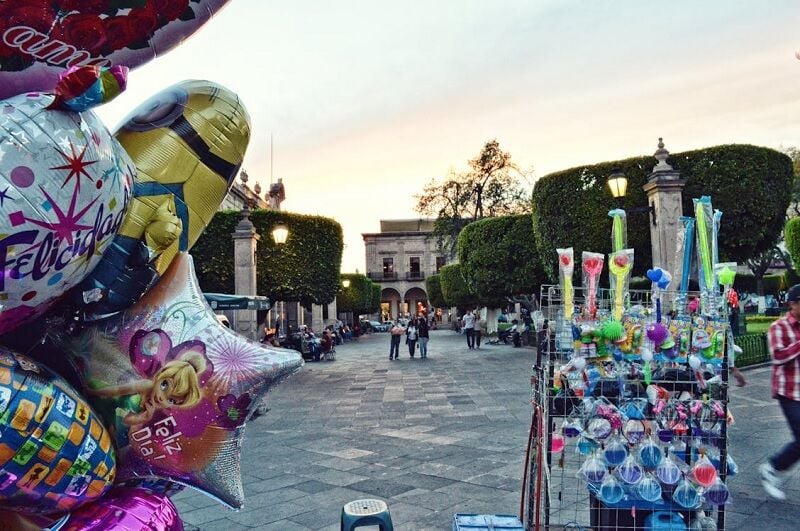
A Thai grilled squid vendor turned himself in and expressed remorse after allegedly striking a Pattaya city official who requested him to move his sidecar motorcycle from obstructing traffic.
The vendor, however, denied the physical assault, citing stress from poor sales as the trigger for the incident. He claimed their encounter was limited to a verbal disagreement and a shirt tug.
Pattaya police yesterday, July 29, invited Siwachett Nakham, a 42-year-old former temporary employee at the government’s Public Works Department and a current grilled squid vendor, to meet with an investigator to address the dispute.
Related News: Legend enjoys spring
The altercation involved Siwachett and a 40-year-old Pattaya city official, Udon Woranam, who had requested Siwachett to move his vehicle, blocking traffic near Jomtien Beach in front of the Dongtan Police Box. Siwachett was accused of punching Udon after the latter politely asked him to move his motorcycle. Siwachett, who acknowledged being the person in the video, denied the physical assault, maintaining that he only had a verbal confrontation with Udon and tugged his shirt.
He cited stress from poor sales and financial burdens as the reasons behind his behavior.
“I did not intend to harm Mr Udon because I had worked with the Public Works Department before, so I knew hitting an official was a bad idea.”
Siwachett apologized for his actions, and Udon said he did not wish to pursue the matter further. Despite this, Pattaya City insisted on taking legal action against the vendor to set a precedent and deter similar future incidents.
Selling goods
Additionally, Udon advised other vendors to remain calm, control their emotions, and adhere to the designated areas for selling their goods according to the law.
Following resolving this dispute, traffic police officers from Pattaya Police Station raided vendors illegally selling goods on public sidewalks and roads around Pattaya. This operation was in response to tourists’ complaints about obstructions and hazards caused by unorganized vendors.
When authorities arrived near Pattaya Police Station’s Dong Tan substation, they encountered heavy traffic congestion caused by street vendors parking on the road. Some vendors attempted to evade arrest by speeding through the officers’ blockade, putting the safety of officers and nearby individuals at risk.
Thai police managed to apprehend 12 vendors, who will now face legal proceedings for violating traffic and cleanliness laws. The police also announced plans to increase daily inspections in collaboration with municipal officials to restore public spaces for residents and tourists, reported the Pattaya News.
-

 News1 year ago
News1 year agoMICE industry must prioritise people management to sustain growth
-
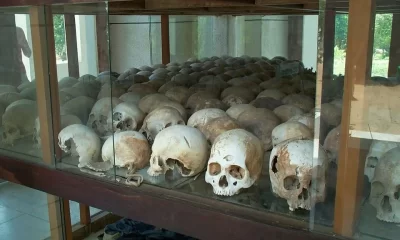
 Entertainment2 years ago
Entertainment2 years agoDark history to exotic delights: Cambodia and Thailand tourist strategy
-

 Entertainment2 years ago
Entertainment2 years agoJohn Legend enjoys spring break in Phuket
-
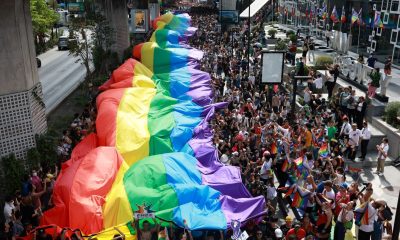
 Entertainment2 years ago
Entertainment2 years agoSiam Paragon and Bangkok Pride proudly celebrates Pride Month from May 31 – June 4, 2024
-

 Entertainment2 years ago
Entertainment2 years agoPhuket’s Tourist Case court division resumes after four-year break
-

 Fashion2 years ago
Fashion2 years agoGold prices in Thailand surge with ornaments at 37,350 baht
-

 Fashion2 years ago
Fashion2 years agoFashion brands linked to brutal slaughter of reptiles in Thailand (video)
-
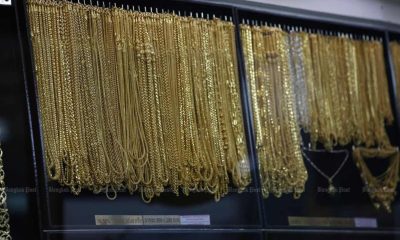
 Fashion2 years ago
Fashion2 years agoFed’s rate cut sends gold soaring past US$2,200 per ounce




